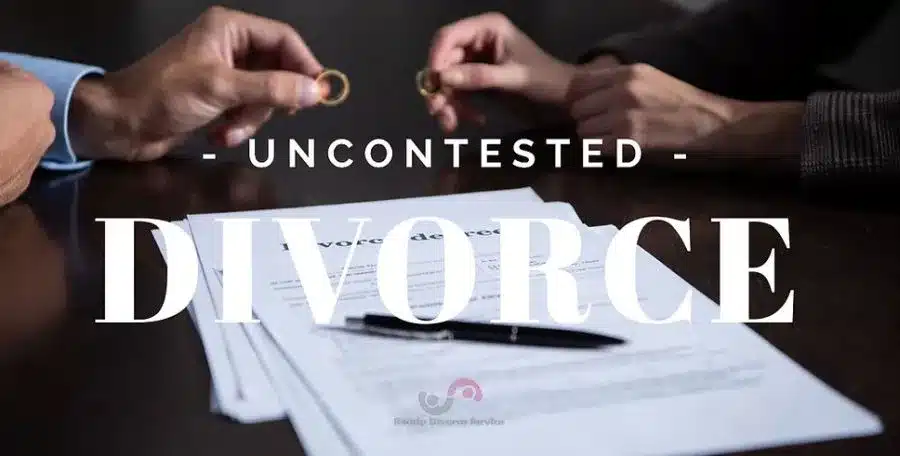How to Remove Ex Spouse from Deed in Texas
Generally, a home or other real estate purchased during a marriage is presumed to be community property and is owned by both spouses. Regardless if only one spouse is on the deed, the property is owned by both parties.
If spouses have purchased real estate property during their marriage, the property will need to be divided when they get divorced. In most cases, one of the ex-spouses’ names will need to be removed from the deed after the divorce.
Divorce Deed
The deed which transfers the share of the property owned by one spouse to the other spouse may be referred to as a Divorce Deed.
Most often, the Divorce Deed used is the Special Warranty Deed. The deed transfers the property as required by the divorce.
How to Transfer House Title After Divorce in Texas
Your divorce decree should contain proper language that clearly states which spouse is awarded legal ownership of the real property.
The divorce decree itself may operate as a muniment of title. This means that the decree alone may be sufficient to transfer the house title after your divorce. However, your divorce decree alone DOES NOT change the property records to reflect the new owner of the property.
In order to update the property records, you will need to do one of the following:
- File a property deed transferring the real estate to the person awarded the property in the divorce.
OR - File your divorce decree in the public property records to show the transfer.
Special Warranty Deed After Texas Divorce
When transferring property after divorce in Texas, you need to use a Warranty Deed. A General Warranty Deed or Special Warranty Deed may be used, however, the most common deed used after a divorce is a Special Warranty Deed.
The spouse whose name is to be removed from the title will need to sign the deed in front of any notary. This can be done anywhere in the world.
The signed and notarized deed will then need to be filed with the county clerk’s office in the county where the property is located.
Good to know: Only the original signed deed can be filed. A copy cannot be filed. The deed cannot be faxed or emailed to be filed.
Note: The county clerk will charge a recording fee, usually about $30 to $40, to file the deed. Keep in mind, the county clerk typically does not accept a personal check. Most recording offices will accept cash, a certified check or a money order. It is a good idea to call ahead to confirm the method of payment accepted.
Once the deed has been filed, the original will be returned to the new owner of the property.
Also, the tax records will be updated, and the taxes will be billed to the new owner.
Good to know: The Warranty Deed transfers ownership of property, but it DOES NOT remove a spouse from the mortgage. Only the mortgage company can remove a person from the mortgage.
Quitclaim Deed After Texas Divorce
Although they are used in many states, it is not recommended that you use a Quitclaim Deed after a divorce in Texas.
Quit Claim Deeds do not transfer real estate property in Texas.
When used appropriately, a Quitclaim is used to give up or relinquish any claims or interest in a property.
The Quit Claim Deed DOES NOT contain language which conveys or transfers property. Nor does a Quitclaim offer any warranty of title.
Good to know: Quitclaim Deeds are generally not sufficient in Texas for title companies to insure property title. Title companies will most often require a Warranty Deed.
Transfer the Property as Soon as Possible After the Divorce
We recommend signing and filing the Special Warranty Divorce Deed as soon as possible once the divorce is completed.
You do not want to wait several years, and then need to find your ex-spouse to sign the deed.
The deed should be signed at the time the divorce is granted if at all possible.
However, if you didn’t sign a deed transferring the property after the divorce, it can be signed at any time. You will just need to find your ex-spouse and convince him or her to cooperate with you and sign the deed.
Related: What If My Ex Won’t Sign Quit Claim Deed
File Your Divorce Decree as an Option
If you cannot locate your ex-spouse or if he or she will not cooperate with you, you may be able to file a certified copy of your divorce decree in the public property records. In this case, the divorce decree may operate as a muniment of title. The decree is filed in the county clerk’s office to show you were awarded the property.
The divorce records are maintained by the district clerk. The property records are maintained by the county clerk.
Good to know: Most divorce decrees in the district clerk’s office are not available to be seen by the public. They are confidential documents.
Keep in mind, in order to file the divorce decree in the property records, you need a certified copy of the divorce decree. The county clerk will not accept a regular copy.

A certified copy of a divorce decree has a stamp on it signed by the clerk stating it is a certified copy. Once you have your certified copy, you will need to file it in the property records. This is done at the county clerk’s office in the county where the property is located.
Good to know: Be sure to black out any confidential information you do not want to be seen in the public records.
Once the decree is filed in the property records of the county clerk, it is a public record which can be viewed by anyone with a computer.
To avoid making your divorce decree a public record, it is recommended that you obtain a Warranty Deed and file it instead.
Divorce Lien
A Divorce Lien is a lien granted in a divorce decree to balance the property division in a divorce.
In some cases, one spouse is awarded a lien on the property for that spouse’s equity interest in the property.
If the spouses have, for example, $10,000 equity in the house, one spouse may be awarded a divorce lien for $5,000 to pay for the equity.
When the house is sold or the mortgage is refinanced, the divorce lien will need to be paid.
Once the divorce lien is paid, a Release of Lien will need to be signed by the spouse awarded the lien.
Owelty Lien
If you obtain a loan to buy-out your spouse’s interest in the property, your lender may require the use of an Owelty Lien.
An Owelty Lien is used when one co-owner is buying the interest of the other owner.
An Owelty Lien is a lien on 100% of the property, not just on the 50% interest you are buying from your spouse/co-owner.
Looking for more advice about divorce? Here are a few of our favorite resources:
- The 9 Basic Steps for a Divorce in Texas
- What Is the Waiting Period for Divorce in Texas?
- General Warranty Deed vs Special Warranty Deed
- 10 Fascinating Facts about Divorce in Texas







Cool Stuff